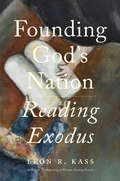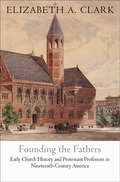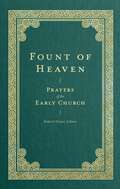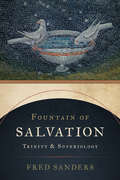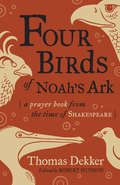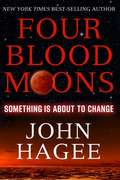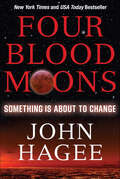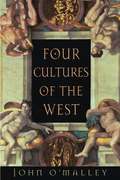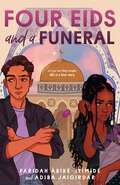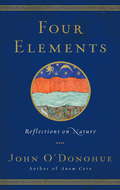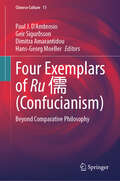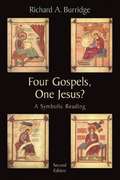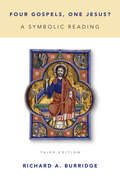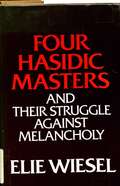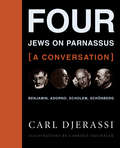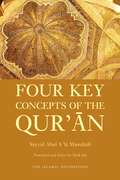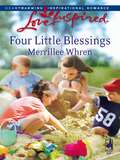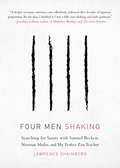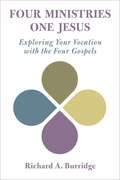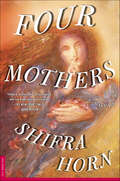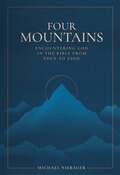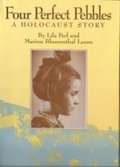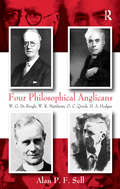- Table View
- List View
Founding God’s Nation: Reading Exodus
by Leon R KassIn this long-awaited follow-up to his 2003 book on Genesis, humanist scholar Leon Kass explores how Exodus raises and then answers the central political questions of what defines a nation and how a nation should govern itself. Considered by some the most important book in the Hebrew Bible, Exodus tells the story of the Jewish people from their enslavement in Egypt, through their liberation under Moses&’s leadership, to the covenantal founding at Sinai and the building of the Tabernacle. In Kass&’s analysis, these events began the slow process of learning how to stop thinking like slaves and become an independent people. The Israelites ultimately founded their nation on three elements: a shared narrative that instills empathy for the poor and the suffering, the uplifting rule of a moral law, and devotion to a higher common purpose. These elements, Kass argues, remain the essential principles for any freedom-loving nation today.
Founding the Fathers: Early Church History and Protestant Professors in Nineteenth-Century America (Divinations: Rereading Late Ancient Religion)
by Elizabeth A. ClarkThrough their teaching of early Christian history and theology, Elizabeth A. Clark contends, Princeton Theological Seminary, Harvard Divinity School, Yale Divinity School, and Union Theological Seminary functioned as America's closest equivalents to graduate schools in the humanities during the nineteenth century. These four Protestant institutions, founded to train clergy, later became the cradles for the nonsectarian study of religion at secular colleges and universities. Clark, one of the world's most eminent scholars of early Christianity, explores this development in Founding the Fathers: Early Church History and Protestant Professors in Nineteenth-Century America.Based on voluminous archival materials, the book charts how American theologians traveled to Europe to study in Germany and confronted intellectual currents that were invigorating but potentially threatening to their faith. The Union and Yale professors in particular struggled to tame German biblical and philosophical criticism to fit American evangelical convictions. German models that encouraged a positive view of early and medieval Christianity collided with Protestant assumptions that the church had declined grievously between the Apostolic and Reformation eras. Trying to reconcile these views, the Americans came to offer some counterbalance to traditional Protestant hostility both to contemporary Roman Catholicism and to those historical periods that had been perceived as Catholic, especially the patristic era.
Fount of Heaven: Prayers of the Early Church (Prayers of the Church)
by Robert ElmerYou are the fountain of life, light, and all grace and truth The hearts of the first Christians beat with praise for Christ. The strength of their devotion is remarkable, considering the times of uncertainty and persecution in which they lived. Despite all of this, the early church flourished, sustained by the God to whom they prayed. Christians today have a lot to learn from the devotional life of the early church. In Fount of Heaven, a collection of carefully selected prayers from the first six centuries of the church, we can pray with our spiritual forefathers. Prayers from luminaries such as Clement of Rome, Irenaeus, and Augustine are arranged by theme to reveal the right prayer for the moment. The prayers have been slightly updated to read more easily, but they retain their joy and mystery. As we turn to the prayers of the first Christians, we can return to the foundations of our own faith.
Fountain of Salvation: Trinity and Soteriology
by Fred SandersA trinitarian exposition of Christian soteriology The relation of God and salvation is not primarily a problem to be solved. Rather, it is the blazing core of Christian doctrine, where the triune nature of God and the truth of the gospel come together. Accordingly, a healthy Christian theology must confess the doctrine of the Trinity and the doctrine of salvation as closely related, mutually illuminating, and strictly ordered. When the two doctrines are left unconnected, both suffer. The doctrine of the Trinity begins to seem altogether irrelevant to salvation history and Christian experience, while soteriology meanwhile becomes naturalized, losing its transcendent reference. If they are connected too tightly, on the other hand, human salvation seems inherent to the divine reality itself. Deftly navigating this tension, Fountain of Salvation relates them by expounding the doctrine of eternal processions and temporal missions, ultimately showing how they inherently belong together. The theological vision expounded here by Fred Sanders is one in which the holy Trinity is the source of salvation in a direct and personal way, as the Father sends the Son and the Holy Spirit to enact an economy of revelation and redemption. Individual chapters show how this vision informs the doctrines of atonement, ecclesiology, Christology, and pneumatology—all while directly engaging with major modern interpreters of the doctrine of the Trinity. As Sanders affirms throughout this in-depth theological treatise, the triune God is the fountain from which all other doctrine flows—and no understanding of salvation is complete that does not begin there.
Four Birds of Noah's Ark: A Prayer Book from the Time of Shakespeare
by Thomas DekkerA timeless, little-known literary classic to engage a new generation of readers As the Black Death ravaged London in 1608, in the midst of societal chaos and tragedy, playwright Thomas Dekker wrote Four Birds of Noah&’s Ark, a book containing fifty-six prayers for the people of London and all of England. The prayers in this book bear witness to Dekker&’s deep faith with a power and poignancy that few written prayers in English literature achieve. Bringing Dekker&’s devotional classic back into print for the first time since 1924, editor Robert Hudson has annotated the prayers and modernized their language without sacrificing their enchanting beauty and simplicity. Hudson&’s substantive and illuminating introduction is a gem in itself.
Four Birds of Noah's Ark: A Prayer Book from the Time of Shakespeare
by Thomas DekkerA timeless, little-known literary classic to engage a new generation of readers As the Black Death ravaged London in 1608, in the midst of societal chaos and tragedy, playwright Thomas Dekker wrote Four Birds of Noah&’s Ark, a book containing fifty-six prayers for the people of London and all of England. The prayers in this book bear witness to Dekker&’s deep faith with a power and poignancy that few written prayers in English literature achieve. Bringing Dekker&’s devotional classic back into print for the first time since 1924, editor Robert Hudson has annotated the prayers and modernized their language without sacrificing their enchanting beauty and simplicity. Hudson&’s substantive and illuminating introduction is a gem in itself.
Four Blood Moons: Something Is About To Change
by John HageeInspired by NASA projections and recorded history, Pastor John Hagee reveals direct connections between four upcoming blood-moon eclipses and what they portend for Israel and all of humankind. Hagee divides the book into three sections. In Section 1, he explains the importance of Israel; in Section 2, he discusses the current distressed state of the world, expounds on the Gospel message of salvation, and describes his view of the Rapture; and in section 3, he elucidates upon the Blood Moons of the past and present and shows their relationship to the Jewish Biblical feasts of Passover and the Feast of Tabernacles. Throughout the book, Hagee encourages his readers to attend fervently to the signs in the heavens and to become ready for the events of the future. For those readers interested in Biblical prophecy and in end-time discussions, they should read this book to learn about the current thinking that is espoused by some Christians and by some Messianic Jews and Gentiles.
Four Blood Moons: Something is About to Change
by John Hagee". . .There will be signs in the sun, in the moon, and in the stars. . .Now when these things begin to happen, look up and lift up your heads, because your redemption draws near." Luke 21:25a, 28It is rare that Scripture, science, and history align with each other, yet the last three series of Four Blood Moons have done exactly that. Are these the "signs" that God refers to in His Word? If they are, what do they mean?What is their prophetic significance?
Four Cultures of the West
by John W. O'MalleyThe workings of Western intelligence in our day--whether in politics or the arts, in the humanities or the church--are as troubling as they are mysterious, leading to the questions: Where are we going? What in the world were we thinking? By exploring the history of four "cultures" so deeply embedded in Western history that we rarely see their instrumental role in politics, religion, education, and the arts, this timely book provides a broad framework for addressing these questions in a fresh way. The cultures considered here originated in the ancient world, took on Christian forms, and manifest themselves today in more secular ways. These are, as John W. O'Malley identifies them: the prophetic culture that proclaims the need for radical change in the structures of society (represented by, for example, Jeremiah, Martin Luther, and Martin Luther King, Jr.); the academic culture that seeks instead to understand those structures (Aristotle, Aquinas, the modern university); the humanistic culture that addresses fundamental human issues and works for the common good of society (Cicero, Erasmus, and Eleanor Roosevelt); and the culture of art and performance that celebrates the mystery of the human condition (Phidias, Michelangelo, Balanchine). By showing how these cultures, as modes of activity and discourse in which Western intelligence has manifested itself through the centuries and continues to do so, O'Malley produces an essay that especially through the history of Christianity brilliantly illuminates the larger history of the West.
Four Eids and a Funeral
by Adiba Jaigirdar Faridah Àbíké-ÍyímídéEx-best friends, Tiwa and Said, must work together to save their Islamic Center from demolition, in this romantic story of rekindling and rebuilding by award-winning authors Faridah Àbíké-Íyímídé & Adiba Jaigirdar! The town of New Crosshaven has it all—even its own infamous love story. These days, Said Hossain spends most of his time away at boarding school. But when his favorite hometown librarian, Ms. Barnes, dies, he must return to New Crosshaven for her funeral and for the summer. Too bad being home makes it a lot harder to avoid facing his ex–best friend, Tiwa Olatunji, or facing the daunting task of telling his Bangladeshi parents that he would rather be an artist than a doctor.Tiwa doesn’t understand what made Said start ignoring her, but it’s probably that fancy boarding school of his. Though he’s unexpectedly staying at home through the summer, she’s determined to take a page from him and pretend he doesn’t exist. Besides, she has more than enough going on anyway, between grieving her broken family and helping her mother throw the upcoming Eid celebration at the Islamic Center—a place that means so much to Tiwa.But when the Islamic Center accidentally catches fire, it turns out the mayor plans to demolish the center entirely. Things are still tense between the ex-friends, but Tiwa needs Said’s help if there’s any hope of changing the mayor’s mind, and on top of everything, Said needs a project to submit to art school (unbeknownst to anyone). Will all their efforts be enough to save the Islamic Center, save Eid, and maybe even save their relationship?
Four Exemplars of Ru 儒: Beyond Comparative Philosophy (Chinese Culture #11)
by Hans-Georg Moeller Paul J. D'Ambrosio Geir Sigurðsson Dimitra AmarantidouThis book discusses scholars who have all engaged in comparative philosophy projects, many of whom first rose to fame because of their penetrating insights into the similarities and differences in “Western” and “Chinese” thought. They all went beyond simply looking at how one thinker, one school, or one tradition relates to another: each draws on sources from China and the West. However, their projects—from role ethics to concrete metaphysics, from critiquing individualism to balancing harmony and justice—are attempts at re-evaluating the way we view the world and live our lives. These projects are systematic, thorough tong 通, and comprehensive descriptions of ourselves, the world, and our interactions with others. They are all comparative, but, on top of this, they also aim at making a point that transcends their comparisons. The book thus shows that these great thinkers draw on a multiplicity of resources, and while they might find some ideas closer to home than others, comparison is a necessary constant. Using traditional Confucian vocabulary, this type of philosophizing is described as practicing xue 学, normally understood as “studying” or “learning.” But, it also means to copy, imitate, model, or emulate. In the process of xue, one imitates, but with a nod to differences. This book honors four models of such an attitude to xue. In its examination of some of the most influential scholars in Chinese thought, this is a seminal book for scholars and students in Chinese and comparative philosophy.
Four Gospels, One Jesus
by Richard A. BurridgeIn this very readable book Richard Burridge depicts Jesus through the four Gospel authors' distinctive portraits of him. Without bogging down readers with technical terminology, Burridge brings to bear his research comparing the Gospels with classical biographies and offers a clear interpretation of each Gospel author's portrait. In a particularly striking move, he draws on the traditional symbols of the Gospels - the human face, lion, ox, and eagle - to represent each book's unique picture of Jesus.
Four Gospels, One Jesus?: A Symbolic Reading
by Richard A. BurridgeIn this modern classic Richard Burridge offers an engaging introduction to the New Testament Gospels. Using the ancient visual symbols for the Gospels — human face, lion, ox, and eagle — Burridge presents a clear interpretation of each Gospel author's portrait of Jesus.This new edition contains updated suggestions for further reading and a substantial new Afterword in which Burridge reflects personally on his book's genesis, development, and positive reception over the years. Four Gospels, One Jesus? in this third edition will continue to be appreciated by teachers, students, pastors, and other readers wanting to understand Jesus more fully.
Four Hasidic Masters and Their Struggle Against Melancholy
by Elie Wiesel Theodore M. HesburghFriendship and concern revolves around Hasidism that is against solitude. The concept is to live, share happiness and distress with others.
Four Jews on Parnassus--A Conversation: Benjamin, Adorno, Scholem, Schönberg
by Carl DjerassiTheodor W. Adorno was the prototypical German Jewish non-Jew, Walter Benjamin vacillated between German Jew and Jewish German, Gershom Scholem was a committed Zionist, and Arnold Schönberg converted to Protestantism for professional reasons but later returned to Judaism. Carl Djerassi, himself a refugee from Hitler's Austria, dramatizes a dialogue between these four men in which they discuss fraternity, religious identity, and legacy as well as reveal aspects of their lives--notably their relations with their wives--that many have ignored, underemphasized, or misrepresented. The desire for canonization and the process by which it is obtained are the underlying themes of this dialogue, with emphasis on Paul Klee's Angelus Novus (1920), a canonized work that resonated deeply with Benjamin, Adorno, and Scholem (and for which Djerassi and Gabrielle Seethaler present a revisionist and richly illustrated interpretation). Basing his dialogue on extensive archival research and interviews, Djerassi concludes with a daring speculation on the putative contents of Benjamin's famous briefcase, which disappeared upon his suicide.
Four Jews on Parnassus—a Conversation: Benjamin, Adorno, Scholem, Schönberg
by Carl DjerassiThis book features a CD of rarely performed music, including a specially commissioned rap by Erik Weiner of Walter Benjamin's "Thesis on the Philosophy of History." Theodor W. Adorno was the prototypical German Jewish non-Jew, Walter Benjamin vacillated between German Jew and Jewish German, Gershom Scholem was a committed Zionist, and Arnold Schönberg converted to Protestantism for professional reasons but later returned to Judaism. Carl Djerassi, himself a refugee from Hitler's Austria, dramatizes a dialogue between these four men in which they discuss fraternity, religious identity, and legacy as well as reveal aspects of their lives-notably their relations with their wives-that many have ignored, underemphasized, or misrepresented. The desire for canonization and the process by which it is obtained are the underlying themes of this dialogue, with emphasis on Paul Klee's Angelus Novus (1920), a canonized work that resonated deeply with Benjamin, Adorno, and Scholem (and for which Djerassi and Gabrielle Seethaler present a revisionist and richly illustrated interpretation). Basing his dialogue on extensive archival research and interviews, Djerassi concludes with a daring speculation on the putative contents of Benjamin's famous briefcase, which disappeared upon his suicide.
Four Key Concepts of the Qur'an
by Sayyid Abul MawdudiThis book elucidates these basic Qur'anic concepts: ilah, Rabb, Ibadah and Din in order to bring out fully the Islamic way of life, as distinct from other perspectives. This elaboration goes a long way in developing a sound understanding of the Qur'an. It also explains the man-God relationship in Islam, guiding Muslims on how to lead their lives.
Four Little Blessings
by Merrillee WhrenThe four little noisemakers who'd moved next door to Wade Dalton came with a bonus: their beautiful aunt. Raising the children herself due to some tough circumstances, Cassie Rankin impressed Wade with her selflessness and her beauty. But she was also at least a dozen years his junior--she was too young for him, wasn't she? Besides, Wade came with a secret that would only make life harder for Cassie and the children he'd come to adore, which meant keeping his distance. Something those four little blessings weren't about to let him do!
Four Men Shaking: Searching for Sanity with Samuel Beckett, Norman Mailer, and My Perfect Zen Teacher
by Lawrence ShainbergFrom Pushcart Prize-winning author Lawrence Shainberg, a funny and powerful memoir about literary friendships, writing, and Zen practice.“Inexplicably good karma”—to this, author Lawrence Shainberg attributes a life filled with relationships with legendary writers and renowned Buddhist teachers. In Four Men Shaking he weaves together the narratives of three of those relationships: his literary friendships with Samuel Beckett and Norman Mailer, and his teacher-student relationship with the Japanese Zen master Kyudo Nakagawa Roshi. In Shainberg’s lifelong pursuit of both writing and Zen practice, each of these men represents an important aspect of his experience. The audacious, combative Mailer becomes a symbol in Shainberg’s mind for the Buddhist concept of “form,” while the elusive and self-deprecating Beckett seems to embody an awareness of “emptiness.” Through it all is Nakagawa, the earthy, direct Zen master challenging Shainberg to let go of his endless rumination and accept reality as it is. Browse InsideFour Men ShakingSearching for Sanity with Samuel Beckett, Norman Mailer, and My Perfect Zen TeacherBy Lawrence Shainberg$16.95 - PaperbackOUT OF STOCK: Available for back-order.Qty:Shambhala Publications07/16/2019Pages: 144Size: 5 x 7ISBN: 9781611807295 0Related • Zen ConfidentialBy Shozan Jack Haubner$14.95 Paperback • Nothing Holy about ItBy Tim Burkett$17.95 Paperback • Let the Whole Thundering World Come HomeBy Natalie Goldberg$16.95 Paperback • Single White MonkBy Shozan Jack Haubner$14.95 PaperbackRelated TopicsBuddhist Biography/MemoirWritingDetails“Inexplicably good karma”—to this, author Lawrence Shainberg attributes a life filled with relationships with legendary writers and renowned Buddhist teachers. In Four Men Shaking he weaves together the narratives of three of those relationships: his literary friendships with Samuel Beckett and Norman Mailer, and his teacher-student relationship with the Japanese Zen master Kyudo Nakagawa Roshi. In Shainberg’s lifelong pursuit of both writing and Zen practice, each of these men represents an important aspect of his experience. The audacious, combative Mailer becomes a symbol in Shainberg’s mind for the Buddhist concept of “form,” while the elusive and self-deprecating Beckett seems to embody an awareness of “emptiness.” Through it all is Nakagawa, the earthy, direct Zen master challenging Shainberg to let go of his endless rumination and accept reality as it is.
Four Ministries, One Jesus: Exploring Your Vocation with the Four Gospels
by Richard A. BurridgeCombining the skills of a leading biblical scholar with the wisdom derived from years spent training candidates for ordination, Richard Burridge offers rich reflections on the four gospel portraits of Jesus and shows how they not only inform the calling to ordained ministry but also help sustain the practice of Christian ministry in its various dimensions. Four Ministries, One Jesus is for all who feel called to a life of Christian ministry and want to ground their calling in the teaching and example of Jesus, as provided in the four gospels. Burridge helps readers consider vital questions such as: how to sustain reading, Bible study, and theological reflection in ministry; how to extend pastoral care to people outside as well as inside the Christian community; how to care for self and family; and how to stay attuned to the Spirit by cultivating a fresh and vigorous life of prayer.
Four Mothers: A Novel
by Shifra HornShifra Horn's beautifully imagined novel tells the story of five generations of women in one family against the backdrop of one hundred years in Jerusalem.The story begins with the birth of the family's first boy to Amal, the last generation. Her mother, grandmother and great-grandmother are overjoyed, because the birth of a healthy boy means that the curse against the women of the family has been broken. They tell Amal the story of those "foremothers": Mazal, the orphan, whose ill-fated marriage initiates the curse; her daughter Sara, whose golden hair is a symbol for her power to heal; Sara's daughter Pnina-Mazal, the unwanted child whose talent for knowing others' thoughts brings both joy and sorrow; and her daughter Geula, Amal's mother, whose sharp intellect is her gift and her burden.
Four Mountains: Encountering God in the Bible from Eden to Zion
by Michael NiebauerEncounter Jesus on every page of the Bible Encounter Jesus on every page Read the Bible holistically and simply Learn from the early church How can war stories, farming proverbs, and strange visions draw you closer to Jesus? In Four Mountains: Encountering God in the Bible from Eden to Zion, Michael Niebauer shows how to see the Bible's big story and meet with God in his word. Four mountain-top encounters with God (Eden, Sinai, Tabor, and Zion) unify the Bible's grand story. The earliest Christians read Scripture with attentiveness to symbols and images like mountains and trees. Learning this method of reading helps us connect seemingly disparate stories and encounter God in his word. Gospel-rich, and Scripture-saturated, Four Mountains reveals how we can see Jesus on every page. Open my eyes that I may see the wondrous things of your law. —Psalm 119:18 (New Coverdale Psalter)
Four Perfect Pebbles: A Holocaust Story
by Lila Perl Marion Blumenthal LazanDuring their six-year ordeal of World War II, the Blumenthal family lived in refugee and prison camps, including the notorious concentration camp of Bergen-Belsen in Germany. This is their story, as seen through the eyes of a child.
Four Philosophical Anglicans: W.G. De Burgh, W.R. Matthews, O.C. Quick, H.A. Hodges
by Alan P.F. SellProfessor Sell explores the lives and ideas of four unjustly neglected Anglican philosophers: W.G. De Burgh (1866-1943); W.R. Matthews (1881-1973); O.C. Quick (1885-1944); H.A. Hodges (1905-1976). This study fills an important gap in the history of twentieth-century philosophical and theological thought. Sell argues that these writers covered a wide range of philosophical topics in an illuminating way, and that a comparison of their respective standpoints and methods is instructive from the point of view of the viability or otherwise of Christian philosophizing. He discusses the challenges these four philosophical Anglicans issued to certain important trends in the philosophy and theology of their day, and argues that some of them are of continuing relevance.
